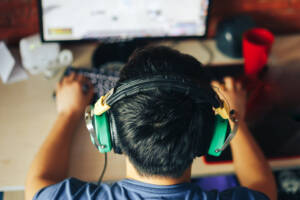Wearable devices for athletes, coaches and sports doctors
Coaches use various digital technologies: wearable devices, video analytics of matches, Big Data analysis technologies, etc. Wearable devices like: insoles with microcircuits in sportsmans’ shoes, microcircuits in clothing and sports equipment send a lot of data, the correct interpretation of which helps the coach to approach each team member in a personalized way.
The sensors provide real-time tracking. Wearable devices detect the level of muscle fatigue and communicate the need for rest or recovery. As a result, coaches and sports physicians gain a holistic view of an athlete’s health. The probability of injury is significantly reduced, and recovery and recuperation are faster.

VR for match preparation
For the 2018 Olympic Games in Pyeongchang (South Korea), American athletes prepared using virtual reality technologies. US players have taken advantage of solutions of the STRIVR startup. Physical training is in first place, and virtual reality is in the second, allowing sportsman to mentally prepare for the performance: to study the position of the goal, the terrain, and how to overcome each turn.
If we talk about the possibilities of AR and VR for the training process, then the German development team has already achieved significant results, which is preparing for the release of the training cognitive-tactical football simulator SoccerBot360.
AR and VR for fans and judges
Many will remember that in 2018 BBC already used AR and VR technology to broadcast the World Cup. Viewers received a 360-degree view of the game. The British football club Liverpool is working on a similar project. The club’s administration understands that even at stadiums with thousands of seats, there is not always enough space for all fans, and not all places are convenient to watch the match. The club is thinking about using VR to broadcast the match more efficiently. Obviously, the fan base with the help of VR will be able to feel the atmosphere close to the stadiums, and possibly even stronger, since the shooting will be carried out from more favorable positions.
Future of VR and AR in sport
No one knows what the future can bring but for now we can say that aren’t stadiums eternal and one day VR will replace them. AR is also more and more included in the practice of both the training process and sports marketing, and its use in refereeing is no longer considered something new. The right use of these technologies will bring sport to another level.
